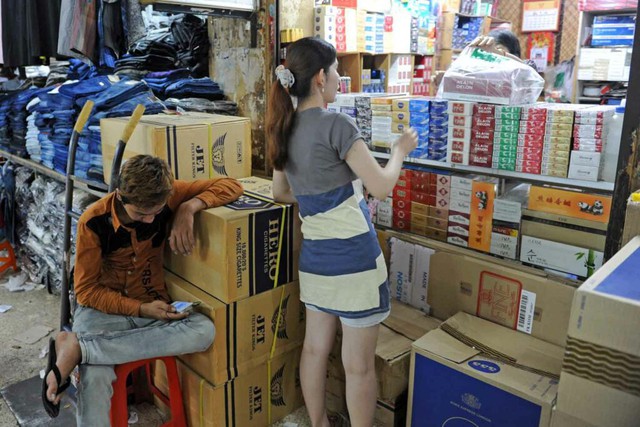WHO strongly recommends Viet Nam impose higher tax rate on tobacco
VGP - The World Health Organization (WHO) strongly recommends Viet Nam impose higher tax rate on tobacco to reduce tobacco consumption.

A wholesale tobacco shop
WHO in Viet Nam launched "Tobacco Taxation to Advance Health and Sustainable Development in Viet Nam," a policy brief that draws on international evidence and uses a global tax simulation model to weigh up the effect of different tax options on health and the economy in Viet Nam.
High rates of smoking are threatening Viet Nam's national tobacco control and health targets, and its long-term aspiration of becoming a high-income country by 2045, according to the new publication.
WHO Representative in Viet Nam Dr Angela Pratt said, "Viet Nam's National Assembly has a unique opportunity in its upcoming session. Reforms to Viet Nam's tobacco tax policy could significantly reduce tobacco's harmful impact on social and economic development, as well as deliver significant social and economic benefits".
"The country's current tobacco tax system is not aligned with international best practice, as recommended by WHO. Reforming the tobacco tax system in Viet Nam could achieve a "win-win" scenario: a win for public health, and a win of generating additional revenue for investment in key Government priorities."
Tobacco is costing the Vietnamese economy in which the annual health and economic costs of tobacco use in Viet Nam are estimated to amount to VND 108 trillion (about US$ 4.5 billion, using the central exchange rate as of November 2022), which is equal to 1.14 percent of GDP annually.
The costs include VND 16.4 trillion (about US$ 683 million) indirect costs due to morbidity and VND 85.8 trillion (about US$ 3.5 billion) due to premature mortality. These are all avoidable costs, which come at the expense of Viet Nam's current and future economic prosperity
Tobacco weakens Viet Nam's workforce in which more than 45 million Vietnamese are at risk from tobacco related illness and premature death, either from direct smoking or secondhand smoke exposure.
Tobacco-consuming households face a higher risk of living in poverty because household expenditure on tobacco is often at the expense of other essential goods such as food and education, because of the catastrophic effect of health care expenditure on tobacco-related illness, and because of the economic burden on the household of premature death of the main income earner.
Tobacco taxation, when used effectively, is the single most effective and cost-effective measure for reducing tobacco use.
WHO estimates that taxing tobacco products to increase the retail price of tobacco products by 10 percent can reduce consumption by as much as 4 to 5 percent.
The tax rate in Viet Nam is very low compared with other countries in the region and globally. In 2022, taxes in Viet Nam comprised about 38 percent compared to 59 percent for all middle-income countries and 62 percent globally, and much lower than WHO recommendation of 75 percent. Viet Nam has one of the lowest tobacco tax rates as a percentage of the retail price among its neighbors in the Association of Southeast Asian Nations.
Vietnamese people's income has increased quickly, but the low tax on tobacco has made cigarettes much more affordable.
WHO quoted success stories in using excise tax on tobacco. The Philippines reduced smoking by 30 percent and increased tax collection by more than 400 percent after tobacco tax reform. In 2012, the country began its tobacco tax reform journey, by merging four tiers of excise tax into one single rate in 2017. Then, tax was increased by 5 peso per pack each year to reach 60 peso (about US$ 1) per pack in 2023. Compared to 2012, excise tax in the premium tier increased by 110%, and in the medium tier by more than 700%. The Philippines' tax increases resulted in a significant decline in the smoking rate: from 27 percent in 2009 to 19.5 percent in 2021, a 30 percent reduction.

WHO Representative in Viet Nam Dr Angela Pratt
New tobacco tax option
WHO recommends a new option that adds a higher amount of specific tax increase such as 75 percent tax increase plus VND15 000 per pack by 2030.
The option will reduce smoking rate to 35.8 percent by 2030, and number of smokers will be reduced by more than 696,000 compared to 2020, reaching the target set by the National Tobacco Control Strategy. It will generate VND29,000 billion more in 2030, nearly 15 times more than under option 1 (baseline) and about 25 percent more compared to the Ministry of Finance's proposed option 2.
Earlier, the Vietnamese Ministry of Finance proposed two options including keeping current tax rate and an increase of 75 percent plus VND10 000 per pack by 2030. The first baseline option will result in worsening of all measures. The smoking rate among adult males will increase significantly in 2030 and the number of smokers will increase by nearly 2.5 million, which is due to both prevalence increase and population growth.
The second option will reduce male smoking rate to about 37.5 percent by 2030 compared to 2020. Under this option, there will be roughly 2.5 million fewer adult smokers in 2030 compared to baseline scenario. However, population growth over this period means that the total number of smokers will remain largely similar to 2020. This option will generate additional revenue of VND21,800 billion in 2030.
Offsetting small losses in tobacco employment
WHO recommends tobacco farmers be supported to switch to other crops which generate equivalent or greater income without having a detrimental impact on the country's health.
In Viet Nam, a recent study showed that Viet Nam has about 13 000 tobacco factory workers, 97 000 full-time equivalent tobacco growers and about 64 000 full-time equivalent workers in the tobacco distribution sector.
In total, the tobacco industry comprises less than 0.4 percent of total workers in the economy. The study also estimated, using the input-output method, that a tax increase of 60 percent (relative) would lead to an increase in total production of the economy (non-tobacco industries) by 0.18 percent and total employment (in other sectors) would increase by 0.24 percent (equivalent to more than 120 000 jobs), likely more than offsetting any small losses in employment in the tobacco industry./.

